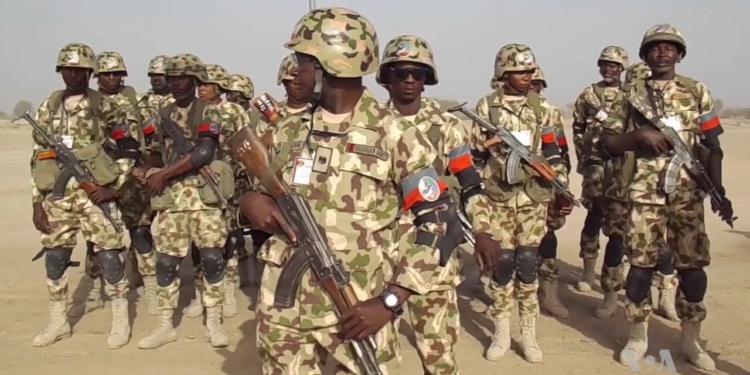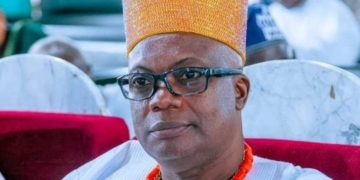The Nigerian Army has come a long way. From the West Africa Frontier Force, WAFF, where it evolved to its current designation as Nigeria Army, the NA has seen lots of transformation and changes all aimed at enhancing professionalism and efficient service delivery. For an army that has won many battles and wars, it has however suffered in the aspect of public perception.
Years back, when soldiers are sighted on the streets, people avoid contact with them or even take to their heels, believing that soldiers know nothing other than to ‘obey the last order’ or ‘kill and go.’
Derogatory names such as ‘Ajuwaya, Go and kill,’ ‘Zombies’ etc were given to army personnel to depict the perception of ruthlessness and lack of human feeling they people hold about them. This belief has not been helped by some unfortunate incidences involving the military and the civil populace. The perception intensified over the years with the handling of the issue of the invasion of Fela’s house by unknown soldiers, the malhandling of then popular business mogul by the military and the invasion of Odi and Zaki Biam etc.
When the current Chief of Army Staff, Lt. General Tukur Yusuf Buratai came on board, it was that obvious that he was worried about the perception of the military by the civil populace and set out quite early to give the average Nigerian soldier a positive image that would make them accepted as integral part of the society and as humane and compassionate as every other member of the society can be.
By 2015 when Lt. Gen TY Butatai assumed command as the Chief of Army Staff, our soldiers were already involved in military operations in many parts of the country including the Northeast where insurgency activities had intensified, in Jos, Plateau State, where there were religious crises as well as in Southern Kaduna and other places.
The presence of soldiers in many of these communities, worsened the perception that they were mainly forces of occupation sent to harass and intimidate the people as well as loot the communities to take spoils of war. Protests were being sponsored against the soldiers with naked women chanting insulting slogans asking the soldiers to leave their communities.
The image of the Nigerian Army clearly needed redemption and that was what the army chief sought to achieve when he assumed office.
Lt. Gen Buratai on assumption of office, in no time, introduced corporate social responsibility into the Nigerian Army as a way of creating a relationship between the people and the Army. He knew there was the need to assure the people that the army in keeping to its constitutional responsibilities is not out to humiliate the ordinary citizen but to help in checking the activities of unwanted elements who threaten the sovereignty of the state and quickly put some measures in place.
Luckily, the measures he put in place to achieve this fusion began to work as people began to see the army as not only performing patriotic duties, but as those who feel the pain of those communities.
Soon, it became a common sight to see children and women coming out to cheerfully welcome troops anywhere they are sighted for any operation. Nigerian Soldiers were pleasantly surprised when the people of Gwoza in Borno State, an area which has suffered devastating attacks by terrorists in the past, came out to clap and hail them as they were passing through the town after a major operation. It was obvious that the people are beginning to realise that the soldiers are not what they had believed them to be.
Apart from helping to deescalate criminal activities in many parts of Nigeria, the soldiers have undertaken to do more to assure citizens of their good intentions. They have organised classes for warring communities, helped in clearing blocked drainage through environmental sanitation exercises, constructed bridges and other public service structures and donate to communities and have equally engaged members of communities in dialogue.
The Chief of Army staff, for instance, took the level of interaction with the populace at the highest level by personally going to communities and speaking with the people. He has several times gone to Borno and Yobe States to assure communities of the capacity of troops to handle threatening security situations and has been to Katsina, Zamfara and to Birnin Gwari in Kaduna State to have a firsthand impression of the problems there.
In Birnin Gwari, the army constructed a bridge over a stream that made it difficult for vehicles to pass. The army chief also flagged-off the 2 Battalion Forward Operation Base (FOB) in fulfilment of his promise to establish an army formation in the area.
Prior to Birnin Gwari, the army chief laid the foundation stone for the building of a military barracks in Kafanchan in Jema’a local government area of Kaduna State in fulfillment of the Federal Government’s promise to establish two military formations in Southern Kaduna to ensure security in the zone.
Then in May 2017, Buratai commissioned the Nigerian Army School of Artillery Officers Mess which provides accommodation for troops when they report to new units before they are quartered. This one may say is for the Army alone but help to bring development n terms of social amenities such as schools, hospitals etc which are shared with the host communities.
One of the most commendable efforts of the army in this regard, is the commissioning of situation rooms for election monitoring to stop violence. This was Lt. Gen Buratai’s way of contributing to a transparent election unlike in the past where soldiers go into unholy alliance with politicians to rig elections in Nigeria. Our last election cannot be adjudged as the best in history but one credible exercise that international observers have continued to laud the role of the Army.
Buratai explained during the commissioning that post election violence which characterized previous elections clearly highlights the challenges posed by incidents of electoral violence in the country, hence he said, the NA saw the need to devise new strategies of stemming such ugly tides or completely eliminate them..
He said, having observed this cycle of violence reoccur severally in past electioneering processes, the NA has thus deemed it necessary to adopt a proactive and responsive posture that would allow it better respond to early signs of insecurity before they could escalate into a major security challenge.
In the Northeast, the Chief of Army Staff also added value to the lives of the people of the region by building an army university in Biu, one of the local governments being targeted by the insurgents. A development model for the north east mirrored after countries that have witnessed wars in the past and how the scars were wiped out.
Lt. Gen. Buratai also established Nigerian Army Brigades in Monguno, Gubio, Gwoza, Damaturu and Damboa to enhance security in the area. This is because as a war strategist. Gen. Buratai understood that holding a recovered ground is more important in any war than just winning the battle.
He designayed the Sambisa Forest as Nigerian Army Training Area and established a Command Secondary School to help with the education of their children .
The measures have worked to such an extent that these days, when troops are sighted, people no longer run to take cover but come out to shake hands with them. At 157, the people of Nigeria can proudly call the Nigeria Army their own.
Johnson is a freelance journalist based in Lagos.






Discussion about this post